by California Casualty | Peace Officers |
As a part of law enforcement, you face difficult situations daily. Stress is everywhere and everyone struggles with it. How it can manifest can depend on the individual’s stress management techniques and lifestyle. Research shows that police officers who don’t manage stress properly are prone to burnout, poor judgment, substance abuse, and suicide. With all of this, it isn’t often that you find an officer that isn’t stressed out.
Here are some of the sources of stress officers encounter:
- Exposure to Distress: the distress of public that you become involved with will at some point affect you. This can take a toll on stress and mental health.
- Danger: Many officers experience physical danger daily, especially departments in areas with high crime rates. The possibility of being injured can become heavy mentally.
- Responsibility: The responsibility of protecting lives is a great deal of stress in itself.
- The Pace: Officers must always be ready for all situations at a moment’s notice. Switching from office work to crime work doesn’t allow for much rest causing your mind to rush back and forth.
With all the different stressors, we have tips to help manage your stress.
- Breathe: Practicing deep breaths can create a sense of calm.
- Breakfast: Eating oatmeal is said to help reduce stress. Start your day on the right foot with a beneficial breakfast.
- Exercise: It releases endorphins that eliminate tense muscles and stress.
- Sleep: Schedules can be hectic, but make sure to get enough hours of sleep. Feeling well rested the next day will help with alertness while on duty.
- Have a strong network of family and friends: Close relationships will help provide a strong support system and help with your stressors.
If you feel like the stress of the job is becoming more overwhelming, recognize that there are outlets for help. Reach out to your support system, friends and/or family. Having a life outside of the job will also help with physical and mental health. There are other options for outlets. Seek peer counseling or employee assistance programs, which are in place to assist officers in times of high stress.
by California Casualty | Peace Officers |

As my family drives to friends or relatives homes for the holidays, we invariably pass a police officer busy working to keep the community safe. It’s easy to forget that crime doesn’t take a holiday, and for many law enforcement officers Thanksgiving, Christmas or New Years are a regular work day. While most of us will be enjoying presents, meals and special time with our families, officers will be patrolling the streets responding to emergencies and keeping drunk drivers off the roads.
Some of them find ways to make the holidays better for others by sponsoring toy and gift drives for children, giving “tickets” for safe driving redeemable for movies and other treats (police officers in one Michigan town stopped drivers and learned what gift they really wanted while other officers drove to stores and actually bought the presents and surprised them), and others have performed heartwarming acts like buying hot meals or clothing for homeless people in the cold or providing holiday gifts for families who couldn’t afford them.
So this holiday season, let’s not forget the men and women who swear an oath to protect and serve us, even on holidays. Here are some simple ways we can let them know we appreciate all they do:
- Bring some baked goods to a police station
- Deliver some thank you cards
- Pay for their coffee or meal
- Write a letter to your local newspaper thanking them for their dedication to the community
- Make a donation to an organization that assists injured officers or a police memorial fund
- Volunteer with your local law enforcement community outreach programs
- Share a story on the Thank a Police officer Facebook page
Sources for this article:
https://newyork.cbslocal.com/2012/11/29/picture-of-nypd-officer-giving-barefoot-man-boots-goes-viral/
https://www.today.com/news/surprise-video-shows-cops-stopping-drivers-give-them-holiday-gifts-1D80349124
https://blog.baudville.com/10-ways-to-thank-a-police-officer-during-national-police-week
https://www.facebook.com/Thank-a-Police-officer-95266281978/
This article is furnished by California Casualty, providing auto and home insurance to educators, law enforcement officers, firefighters and nurses. Get a quote at 1.800.800.9410 or www.calcas.com.
by California Casualty | Firefighters, Peace Officers |
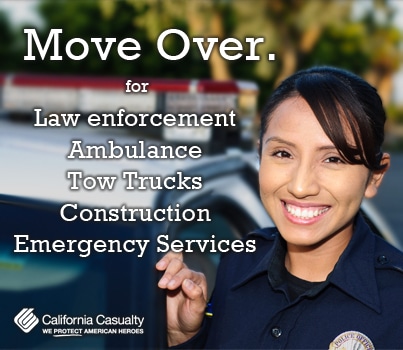
Have you ever stood on the side of a busy road or highway? It can be a bit intimidating as traffic roars by; you can feel the wind of speeding cars and trucks and the sting from dust and pebbles thrown as they fly past. Now imagine that you are a first responder, law enforcement officer or maintenance worker trying to do a job, often just off of or in busy lanes of traffic.
Every day the people who protect us put their safety and lives on the line when they get out of their vehicles to help a stranded motorist, block a lane of traffic, clear up debris or provide first aid to someone hurt in a crash. This should be a reminder that we all need to be more careful as we drive along the byways and highways on our daily commutes or while on a special trip. Over the next hill or around the next curve could be an unexpected situation with a first responder or law enforcement officer who might be in a vulnerable situation while trying to help others.
Just such a situation recently turned deadly for 33 year old Colorado State Trooper Jamie Jursevics who was hit and killed while assisting people involved in a crash off I-25. Another driver, who has been charged with driving while intoxicated and vehicular manslaughter, slammed into Trooper Jursevics. She died at the scene leaving behind a husband and an eight month old daughter.

The pain that Jursevics’ family is enduring is felt by hundreds of others every year. The National Law Enforcement Officer Memorial Fund reports that between 2005 and 2014, 134 officers died after being struck by a vehicle. In addition, hundreds of highway construction and maintenance workers were also struck and killed while on the job.
We all owe the men and women who keep our roads safe our undivided attention. This means not being distracted by cell phones or other electronic devices, never driving while overly tired or after consuming alcohol or taking certain prescription drugs, and slowing down when we see emergency vehicle lights either in traffic or off to the side of the road. It’s hard to imagine the horror of being distracted and causing injuries or death.
That’s why all 50 states now have Move Over laws on the books, to try and protect the men and women who protect us. Move Over laws require motorists to slow down, change lanes or move over as far as possible when approaching an emergency vehicle. More of us need to be informed about those laws, though; with surveys showing that 71 percent of Americans still have not heard of Move Over laws.
The American Safety Council reminds us to be extra vigilant when we see an emergency vehicle and to:
- Pull as far to the right as possible to let them pass
- Stay at least 500 feet behind them
- Move as far over as possible when nearing a stopped emergency vehicle with lights activated and slow to a speed not more than 20 miles less than the posted speed limit
The men and women who swear to serve and protect us, as well as ambulance drivers, tow truck operators and construction workers deserve all the extra safety we can give them.
by California Casualty | Peace Officers |

I think we can all admit that one time or another we’ve been in a hurry and exceeded the speed limit. Sure, it’s not safe, it depletes your gas mileage and you could get a stopped by an officer. And, when it happens your heart is pounding and you are nervous, but apparently you can get out of being cited with a good story. While we don’t condone going over the speed limit, here are some of the best stories to avoid a ticket we’ve heard:
- A father said he was late picking up his daughter from school and didn’t want her waiting there alone
- A wife explained she was mad at her husband and was practicing what she would say when she got home; the more she thought about it, the madder she got and the faster she drove – the patrolman let her go with a warning (glad he wasn’t the husband)
- A grandmother who explained she was rushing home before the ice cream she had just bought at the store melted
- A driver who explained he was speeding up to read the license plate of the vehicle in front of his because the driver had thrown a beer bottle out the window
- A woman who claimed she spilled her M&Ms and didn’t realize how fast she was going as she tried picking them up – the officer let her go after she offered him one
- A woman who told an officer she was trying to keep up with traffic; he noted there was no traffic she replied that’s how far behind she was (creativity does work sometimes)
- Doctors, nurses and hospital workers who claim they are on the way to an emergency
Now keep in mind, no matter how creative you are, getting a moving violation can endanger you and others, and may affect your auto insurance rates. The best course of action is to follow the rules of the road and capitalize on your good driving record.
There’s really no good excuse for not having adequate insurance. A California Casualty advisor can provide you with a policy review to make sure you are getting the best rate and the discounts you deserve at 1.800.800.9410 or at www.calcas.com. Oh, and be careful out there and look out for the other driver who is still working on their excuse. And if you’ve heard of a good one that worked, or have been the recipient of one, let us know.
Sources for this article:
https://www.dailyfinance.com/photos/best-traffic-ticket-excuses/?photo=2#!fullscreen&slide=985217
https://www.dmv.org/articles/top-traffic-ticket-excuses/
https://policelink.monster.com/topics/34048-traffic-violation-excuses/posts
https://www.consumerreports.org/cro/news/2013/04/top-10-excuses-for-speeding/index.htm
by California Casualty | Firefighters, Peace Officers |
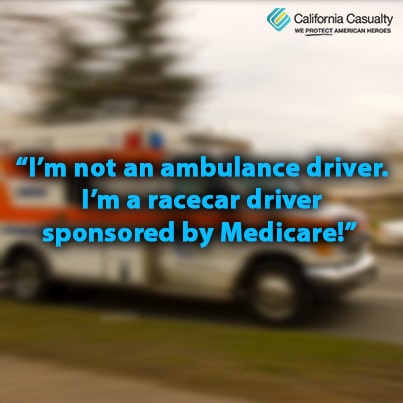
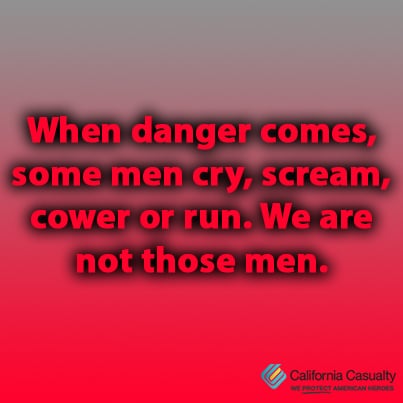
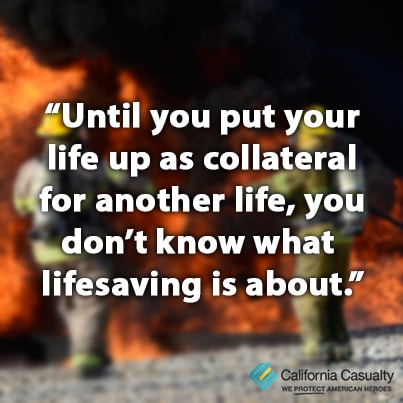
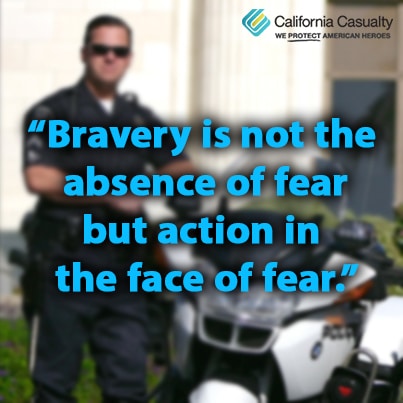
Check out these quotes for other occupations:
Educators
Nurses
by California Casualty | Peace Officers |
If you’re a police officer or law enforcement agent, you are exposed to stressful situations on a daily basis. While your training has equipped you to handle most of these circumstances, your body isn’t always prepared to cooperate.
Too much stress can leave you tired, unfocused, and careless. For both yourself and the city you serve, it’s important that you identify ways to manage and relieve work-related stress before it develops dangerous side effects.
The stress issue for police officers
Each yearvarious accredited groups rank the most stressful jobs and occupations in the US, and police officer is nearly always at or near the top of the list. According to arecent survey dated early 2015, serving as a police officer comes in just behind being a firefighter, enlisted military personnel, military general, or airline pilot.
It depends on the circumstances and location, but in most cases the pressure comes down to a combination of working with dangerous criminals and being under constant scrutiny by the public.
Tips for beating stress
While you can’t separate the scrutiny and risk from the rest of the job duties of being a police officer, you can find constructive ways to reduce stress and enhance your overall quality of life.
Here are a few of the best tips for current and former law enforcement agents:
- Exercise regularly.
 According to a University of Buffalo study, police officers are much likelier to develop metabolic syndrome, which contributes to adult-onset diabetes and heart disease. The work may also entail cancer, emotional health issues, and alcoholism. As a result, it’s incredibly important to get adequate amounts of exercise and physical fitness. For maximum results, this should involve both strength training and aerobic exercise.
According to a University of Buffalo study, police officers are much likelier to develop metabolic syndrome, which contributes to adult-onset diabetes and heart disease. The work may also entail cancer, emotional health issues, and alcoholism. As a result, it’s incredibly important to get adequate amounts of exercise and physical fitness. For maximum results, this should involve both strength training and aerobic exercise.
- Learn to relax.
 In addition to rigorous physical activity, you should enjoy the opposite end of the spectrum: uninhibited relaxation. Each day, make it a priority to find a relaxing place and meditate, pray, or just be with your thoughts. You may also want to give progressive muscle relaxation a try; it serves the dual purpose of relaxing your mind and your body.
In addition to rigorous physical activity, you should enjoy the opposite end of the spectrum: uninhibited relaxation. Each day, make it a priority to find a relaxing place and meditate, pray, or just be with your thoughts. You may also want to give progressive muscle relaxation a try; it serves the dual purpose of relaxing your mind and your body.
- Develop coping skills. Over the course of their career, veteran police officers are often exposed to stressful incidents such as hostage crises, shootings, and car chases. Unless you develop good coping skills, you won’t have a long and healthycareer. Learning to identify negative attitudes and replace them with positive thoughts is easier said than done, but it’s crucial.
- Separate work from home. When you finish your shift and clock out for the day, it’s essential to dump work issues at the door. You need time to spend with your family and friends, and brooding about work does nothing but waste your time off.
- Find non-police officer friends. What portion of your friends are police officers? In many cases it may be 75, 90, or 100 percent. While there’s nothing wrong with liking your coworkers, you need more diversity in your life. Make an effort to find friends from other professions and expand your horizons. It’ll show you there’s more to life than being an officer and enable you to discuss non-work related topics.
While technology certainly presents many benefits on the job, it can be especially relaxing to unplug everything when you’re not working. Turn off your phone, log out of your email, shut off the television, and just slow down. Try reading a book or playing a game with the kids. The slower pace of life without technology can be reenergizing and it removes the burden of constantly checking in on things you can’t control.
California Casualty auto insurance
At California Casualty, we are proud to provide our local police officers with quality, reliable, cost-effective auto insurance as a token of our appreciation.
For more information on our policies and the various benefits we offer, please don’t hesitate to contact us today!










